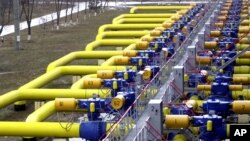BRUSSELS —
European Union leaders will call for greater efforts to cut reliance on imported gas at a Brussels summit next week, a draft document shows, underlining their concern about strained relations with dominant energy supplier Russia over Ukraine.
Ukraine is a transit route for shipping Russian gas to the EU, which relies on Russia for about a third of its supplies.
Past supply disruption because of pricing disputes between Moscow and Kiev had already motivated EU leaders to seek alternatives to Russian gas, but Russia's seizure of Ukraine's Crimea region has increased the EU's focus on diversifying.
“The European Council is concerned about Europe's high energy dependency rates, especially on gas, and calls for intensifying efforts to reduce them, especially in the most dependent member states,” said a draft document prepared for the summit of EU leaders in Brussels on March 20-21.
Some nations, such as Bulgaria, are almost entirely dependent on Russian energy.
“Europe needs to further diversify its energy supply, continue to develop renewable and other indigenous energy sources and coordinate the development of the infrastructure to support this diversification,” the document seen by Reuters said.
The wording on energy dependency was not in an earlier version of the document circulated before Russian forces seized Crimea.
Britain and Poland have been urging shale gas development or nuclear to lessen dependence on imported fossil fuels.
Climate Commissioner Connie Hedegaard says the crisis in Ukraine underlines the argument for renewable energy and Energy Commissioner Guenther Oettinger is pushing for completion of the single energy market to maximize available energy by shipping any surpluses across borders.
Single energy market rules also state Russia's Gazprom cannot dominate pipelines through which it pumps gas on EU territory. That means its South Stream plan to bypass Ukraine breaches EU law known as the Third Energy Package.
The draft document, dated March 10, calls for “effective and consistent implementation of the Third Energy Package by all players in the European energy market”.
Early 2015 deadline for climate goals
Environmentalists and some EU environment ministers have been pressing for next week's leaders' meeting to come to an early agreement on 2030 climate and energy policy.
One of the reasons the European Union is seeking to agree on energy and environment policy to succeed an existing set of 2020 energy targets is the need for the bloc to have a negotiating position as part of U.N. talks on a global deal to tackle climate change.
The deadline for a U.N. deal is at the end of 2015.
The draft only confirms the European Union will submit its contribution by the first quarter of 2015, which will disappoint all those saying an early agreement is vital to provide confidence for investors with very long time horizons.
EU concerns about the impact of energy bills on industrial competitiveness are also reflected in the summit document.
It calls for sustained efforts to moderate costs and asks member states to further examine national policies on energy levies and how great a part taxes pay in final energy prices.
Ukraine is a transit route for shipping Russian gas to the EU, which relies on Russia for about a third of its supplies.
Past supply disruption because of pricing disputes between Moscow and Kiev had already motivated EU leaders to seek alternatives to Russian gas, but Russia's seizure of Ukraine's Crimea region has increased the EU's focus on diversifying.
“The European Council is concerned about Europe's high energy dependency rates, especially on gas, and calls for intensifying efforts to reduce them, especially in the most dependent member states,” said a draft document prepared for the summit of EU leaders in Brussels on March 20-21.
Some nations, such as Bulgaria, are almost entirely dependent on Russian energy.
“Europe needs to further diversify its energy supply, continue to develop renewable and other indigenous energy sources and coordinate the development of the infrastructure to support this diversification,” the document seen by Reuters said.
The wording on energy dependency was not in an earlier version of the document circulated before Russian forces seized Crimea.
Britain and Poland have been urging shale gas development or nuclear to lessen dependence on imported fossil fuels.
Climate Commissioner Connie Hedegaard says the crisis in Ukraine underlines the argument for renewable energy and Energy Commissioner Guenther Oettinger is pushing for completion of the single energy market to maximize available energy by shipping any surpluses across borders.
Single energy market rules also state Russia's Gazprom cannot dominate pipelines through which it pumps gas on EU territory. That means its South Stream plan to bypass Ukraine breaches EU law known as the Third Energy Package.
The draft document, dated March 10, calls for “effective and consistent implementation of the Third Energy Package by all players in the European energy market”.
Early 2015 deadline for climate goals
Environmentalists and some EU environment ministers have been pressing for next week's leaders' meeting to come to an early agreement on 2030 climate and energy policy.
One of the reasons the European Union is seeking to agree on energy and environment policy to succeed an existing set of 2020 energy targets is the need for the bloc to have a negotiating position as part of U.N. talks on a global deal to tackle climate change.
The deadline for a U.N. deal is at the end of 2015.
The draft only confirms the European Union will submit its contribution by the first quarter of 2015, which will disappoint all those saying an early agreement is vital to provide confidence for investors with very long time horizons.
EU concerns about the impact of energy bills on industrial competitiveness are also reflected in the summit document.
It calls for sustained efforts to moderate costs and asks member states to further examine national policies on energy levies and how great a part taxes pay in final energy prices.







